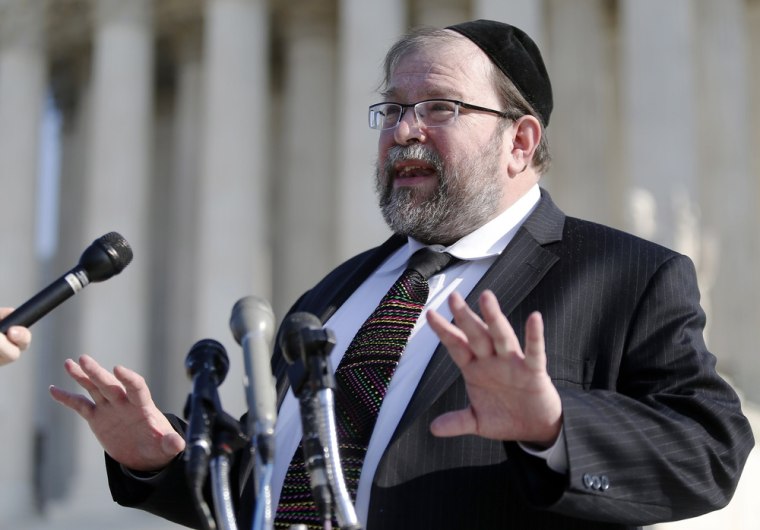So many miles, so many worries. It’s easy to earn frequent flier miles doing just about everything, from shopping for groceries to ordering dinner, but when it comes time to actually use them, all sorts of issues can pop up.
Even as their accounts grow, members of frequent flier programs face lots of uncertainty these days, with looming plan changes, point devaluations, hefty surcharges and the notion that if an airline ever decides to kick them out, there’s little they can do.

The U.S. Supreme Court seemed reluctant this month to expand the right of airline passengers to sue when they're terminated from frequent flier programs. The case involves Minnesota Rabbi S. Binyomin Ginsberg, who was notified in 2008 that his status at Northwest was revoked because he had "abused the program” by frequently complaining and asking for compensation.
A ruling isn’t expected until next summer, but airlines are likely watching the case very carefully, said Tim Winship, publisher of FrequentFlier.com. If the Supreme Court allows the rabbi to sue, “it would certainly open the floodgates to many more such complaints,” he added.
“Because let’s face it, there is a considerable amount of discontent among consumers as far as these programs go,” Winship said.
Ready for a revenue-based program?
Expect more grumbling soon when travelers who are used to getting points for the amount of miles they fly may find out their airline is switching to a revenue-based plan, which awards points for the amount of dollars spent with the carrier.
JetBlue, Southwest and Virgin America already have that model in place, but no major U.S. carrier has made the switch — yet. Industry observers think that’s about to change.
“I do expect 2014 to be an interesting year. I am convinced that one of the legacy carriers will make some sort of move into revenue-based (programs),” said Randy Petersen, founder of Milepoint.com.
If that happens, it would be a tipping point for the airline industry, with the other major airlines likely to follow suit, Winship said.
What does it mean to you? On the plus side, no more complaints about the lack of award seats. You get access to the same seats at the same price as a cash passenger does when you redeem your points, Winship said. The points have a pre-determined value, which you apply to the price of a ticket.
On the other hand, travelers who have learned to squeeze the most miles out of the cheapest ticket in mileage-based plans will be out of luck.
“(They’ve) spent a lot of time and energy over the years getting to know these programs and figuring out how they work and how they get the best value out of them. For those folks, the mileage-based programs do offer much better opportunities to get outsize value,” Winship said.
Petersen and Winship believe Delta might be the first carrier to make the switch, though airline spokesman Paul Skrbec called the discussion speculative and declined to comment on what “may or may not happen in the future.”
The newly combined American Airlines/US Airways is a candidate, too, as it prepares to merge its two loyalty programs.
“They don’t want to make a change and then see Delta or United do a change and then have to change again, so it’s really a unique opportunity for them to get out ahead of the industry,” Petersen said. American Airlines did not reply to a request for comment.
Fliers fume over fuel surcharge
Meanwhile, travelers trading miles for trips or upgrades are finding more obstacles in their way. Some carriers, like United, require passengers to hand over a cash co-pay in addition to miles for certain upgrades.
Then, there’s the particularly “disingenuous and customer unfriendly tactic” of adding a hefty fuel surcharge to award tickets, Winship said.
While U.S. airlines don’t yet impose such fees in their programs (though they sometimes do add them on partner flights), it’s a fairly common practice among the European and Asian carriers, with British Airways doing it to such an extent that it has started to get people’s attention, he added.
Four members of British Airways’ frequent flier program are even suing the airline in U.S. District Court, accusing it of breach of contract.
“Our allegation is that the fuel surcharge is not a fuel surcharge, it’s more like a British Airways profit surcharge and that it’s not based on the cost of fuel,” said David Stellings, an attorney representing the frequent fliers.
“It’s just a source of revenue for the company.”
One of the passengers booked two first-class, round-trip tickets from San Francisco International to London Heathrow Airport last year. He redeemed 150,000 miles, but also paid $1,167 in taxes, fees, and surcharges. The fuel surcharge accounted for $854, according to the lawsuit.
British Airways spokeswoman Caroline Titmuss said the company does not comment on matters of litigation. The carrier asked a judge to dismiss the case, but he allowed it to proceed last month.
Stellings said the decision is a positive development for frequent fliers.
“We’re going to have an opportunity to… shine some light on these practices that we think are bad for consumers,” he said.